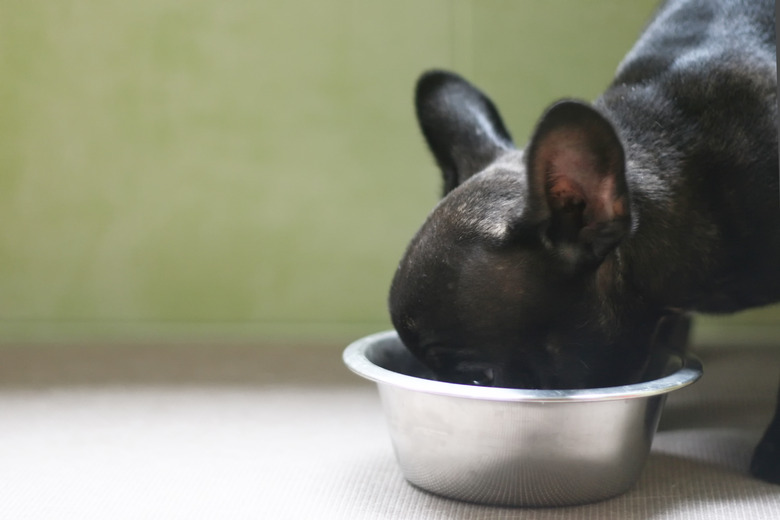What Kind Of Symptoms Will A Dog Have After Ingesting Motor Oil?
Realizing that you have to call your vet and tell him, "My dog drank motor oil" would be a nightmare for any dog owner. While petroleum and related products like motor oil don't seem like something a dog would find appealing, there's no accounting for the strange things dogs are tempted to eat. If your dog eats oil, know the symptoms and what to do.
What's in motor oil?
What's in motor oil?
In a basic sense, motor oil is made from oils and additives. The oils are called "base oils," and they come from crude oil, which is a petroleum product, according to AMSOIL. The additives could be detergents, anti-foam ingredients, anti-corrosion ingredients, dispersants, or other lubricants—none of which you want your dog drinking.
It's hard to believe that a dog would actually want to drink enough motor oil to cause a problem, but there are actually some ingredients in the oil or in other common household products like antifreeze that make it taste sweet to dogs. According to Nutrena, it only takes 1 tablespoon of antifreeze to cause kidney failure in a medium-size dog.
Petroleum distillates and dogs
Petroleum distillates and dogs
Hydrocarbons, or petroleum distillates, are ingredients that are derived from petroleum. These are common around the home and garage. Petroleum distillates are found in products such as kerosene, tiki-torch fuel, gasoline, diesel fuel, paint solvent, wood stain, wood stripper, liquid lighter fluid, asphalt/roofing tar, engine or motor oil, and other items. According to the Pet Poison Helpline, some of these products can be deadly to dogs and cats.
If your dog eats oil, your dog may throw up, but you should never induce vomiting. This can make it worse because the oil could possibly be inhaled into the lungs. Signs of poisoning by petroleum distillates or hydrocarbons include:
- Vomiting
- Drooling
- Increased breathing
- Skin irritation
- Eye irritation
- Walking drunk
- Coma
Ingestion of petroleum
Ingestion of petroleum
There are other ways that your dog can ingest or inhale petroleum products. For instance, using solvents such as benzene or toluene or paint thinner or stripper in an enclosed area can result in your dog inhaling the ingredient. If this happens, be on the lookout for signs of impairment to the nervous system, such as vomiting, acting "drunk," trouble with vision, coughing, or other trouble with breathing.
If he throws up, you may see oil on his mouth or lips. The Merck Manual Veterinary Manual says your dog's feces may become dry days after your dog eats the oil.
Motor oil and mange
Motor oil and mange
According to Veterinary Information Network, it used to be a popular belief that dipping dogs in motor oil could cure mange. This is an old-wives tale that is harmful to dogs. Motor oil is very harsh on dogs' skin, and it can be absorbed through the skin, which can cause all of the poisoning symptoms. If she licks it off her skin, which is likely, she can ingest enough to make herself very sick.
My dog ate cooking oil. What do I do?
My dog ate cooking oil. What do I do?
Let's say you're in the kitchen drying chicken and you leave the room only to return and discover that your dog ate the cooking grease. This probably isn't as bad as if your dog ate oil for an engine. PetCoach says gastrointestinal upset will be likely. Vomiting and/or diarrhea will likely occur.
If it doesn't seem serious, try withholding food and keeping him at home. However, if you notice greasy diarrhea, you will want to get him checked out. When it seems like he can eat again, try giving him a bland diet of plain foods, like boiled chicken and plain white rice. Pancreatitis is a more serious concern that needs to be checked out by a vet. Pancreatitis symptoms include lethargy, loss of appetite, or abdominal pain.
If you believe your dog drank motor oil or ingested something else that is harmful or toxic, call the pet poison helpline at (855) 764-7661.
Always check with your veterinarian before changing your pet's diet, medication, or physical activity routines. This information is not a substitute for a vet's opinion.
References
- PetCoach: My Puppy Ate a Bunch of Cooking Grease. Will She Be OK?
- Veterinary Information Network: Demodectic Mange in Dogs
- Merck Manual Veterinary Manual: Overview of Petroleum Product Poisoning
- Pet Poison Helpline: Petroleum Distillates
- Nutrena: Antifreeze Poisoning in Pets
- AMSOIL: A Beginner's Guide to Motor Oil: What You Need to Know
